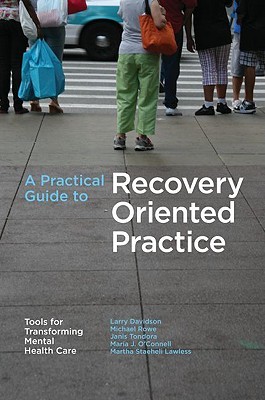| A Practical Guide to Recovery-Oriented Practice: Tools for Transforming Mental Health Care Contributor(s): Davidson, Larry (Author), Rowe, Michael (Author), Tondora, Janis (Author) |
|
 |
ISBN: 0195304772 ISBN-13: 9780195304770 Publisher: Oxford University Press, USA OUR PRICE: $65.55 Product Type: Paperback - Other Formats Published: October 2008 |
| Additional Information |
| BISAC Categories: - Psychology | Clinical Psychology - Psychology | Psychopathology - General - Medical | Psychiatry - General |
| Dewey: 362.22 |
| LCCN: 2008016589 |
| Physical Information: 0.5" H x 6" W x 9.1" (0.85 lbs) 272 pages |
| Descriptions, Reviews, Etc. |
| Publisher Description: This book takes a lofty vision of recovery and of a life in the community for every adult with a serious mental illness promised by the U.S. President's 2003 New Freedom Commission on Mental Health and shows the reader what is entailed in making this vision a reality. Beginning with the historical context of the recovery movement and its recent emergence on the center stage of mental health policy around the world, the authors then clarify various definitions of mental health recovery and address the most common misconceptions of recovery held by skeptical practitioners and worried families. With this framework in place, the authors suggest fundamental principles for recovery-oriented care, a set of concrete practice guidelines developed in and for the field, a recovery guide model of practice as an alternative to clinical case management, and tools to self-assess the recovery orientation of practices and practitioners. In doing so, this volume represents the first book to go beyond the rhetoric of recovery to its implementation in everyday practice. Much of this work was developed with the State of Connecticut's Department of Mental Health and Addiction Services, helping the state to win a #1 ranking in the recent NAMI report card on state mental health authorities. Since initial development of these principles, guidelines, and tools in Connecticut, the authors have become increasingly involved in refining and tailoring this approach for other systems of care around the globe as more and more governments, ministry leaders, system managers, practitioners, and people with serious mental illnesses and their families embrace the need to transform mental health services to promote recovery and community inclusion. If you've wondered what all of the recent to-do has been about with the notion of recovery in mental health, this book explains it. In addition, it gives you an insider's view of the challenges and strategies involved in transforming to recovery and a road map to follow on the first few steps down this exciting, promising, and perhaps long overdue path. |